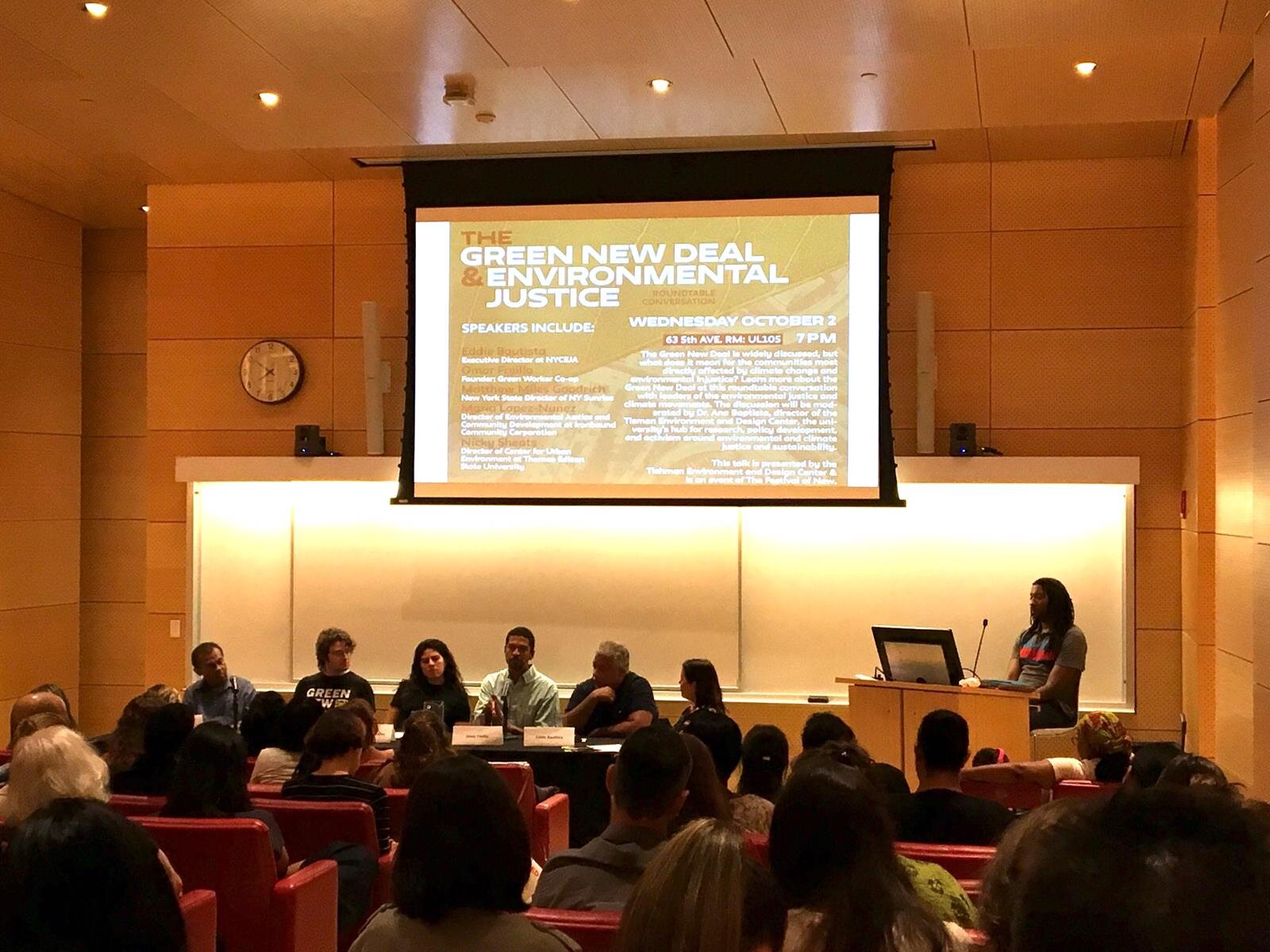"There is Nothing ‘New’ About the Green New Deal"
By Anna Yulsman, Tishman Center Program Coordinator
The Green New Deal (GND) has rapidly become a prevailing topic in popular discourse. As we continue to face climate crisis, the GND platform is praised for promising a new way to imagine our future. A few weeks ago during The Tishman Center’s “Green New Deal and Environmental Justice” event during the The New School’s centennial celebration, we heard from a variety of activists and grassroots organizers including Eddie Bautista, the Executive Director of the New York City Environmental Justice Alliance (NYC EJA), Omar Freilla, the founder of Green Worker Cooperatives, Mathew Miles Goodrich, New York State Director of Sunrise Movement, Maria Lopez-Nunez, the Director of Environmental Justice and Community Development at Ironbound Community Corporation, and Nicky Sheats, the Director of The Center for the Urban Environment at Thomas Edison State University. Moderated by the Tishman Center’s Director, Ana Baptista, the event brought up central concerns for the Environmental Justice movement including, but not limited to, co-opted and stolen narratives, a lack of representation from frontline communities, and a reconfiguring of the same extractive capitalist system in which we currently reside under a green umbrella.
After the 2018 elections, the Sunrise Movement began working on climate change plans known as the Green New Deal. The framework is often known for bringing in issues of housing and jobs to the conversation of climate change and decarbonization. Many of the panellists laid bare the problematic reality that the Green New Deal is not the first framework to do this. Panelist Eddie Bautista opened the conversation by pointing out, “There’s nothing really new about a Green New Deal...as a framework the environmental and climate justice movements have been centering race and disparities and trying to get to systemic change. Not reform, but radical overhaul of systems has been at the core of our work literally for decades.” He explained how the unveiling of the Green New Deal platform represents how frontline black and brown communities are being erased from their own narrative. He mentioned that the Environmental Justice Movement and Climate Justice is defined by the Jemez Principles for Democratic Organizing. At the heart of these principles is the value that “we speak for ourselves.”
Omar Freilla brought up concern that the platform means business as usual stating that if we do not start thinking about climate mitigation policies we will have more of the same: “poor people of color dying and it not being recognized as a crisis until it starts to impact middle class white people.” Ms. Lopez-Nunez followed up by explaining how fundamentally important it is that frontline communities be regarded as leaders and experts as we address climate change. She mentioned the Just Transition as an existing framework created by communities who understand intimately the impacts of climate change and a capitalist, exploitative system, stating that the Green New Deal is more about political candidates than it is about people who are affected. “What’s not guaranteed in that shift in our society is justice, because it’s never been there and it definitely will not be there later unless we work towards it. And it’s only going to happen if the big groups actually get behind organizations led by people of color...The original New Deal left people of color out, so a green one seems like the same thing.”
Miles Goodrich made some hopeful remarks that the Green New Deal platform moves us beyond market mechanism approaches to climate change such as a carbon tax, and allows us to “imagine a better world.” In response to Miles Goodrich’s hopeful remarks, Dr. Sheats followed up with concern that without the details, the Green New Deal does not promise to address the cumulative impacts Environmental Justice communities face. He asked, “who gets to fill in these details?” stressing that the platform does not rule out market mechanisms and doesn’t ensure there will be mandatory emissions reductions for EJ communities. Cumulative impact describes the multiple sources of stress communities of color and low-income communities face including but not limited to, multiple pollution sources, unaffordable housing and health care, unemployment, etc… Mainstream environmental policy platforms, including the Green New Deal, fail to recognize the holistic impact these stressors create.
The panel ended by looking beyond the Green New Deal for new ways to address climate injustice. Democracy, wealth redistribution, and political courage were amongst the responses from panelists. The Just Transition was mentioned several times as an alternative to the GND, many panelists wished that it had gone viral instead. Overall they made it clear that the only way to tackle climate injustice is to take a systematic and holistic approach. Capitalism and injustice move hand in hand and we will not be able to leave the climate crisis behind without abandoning the capitalist system that creates it. While this may seem daunting, the panel offered a great place to start: listening to impacted communities and following their lead.
Speakers
Eddie Bautista
Executive Director of New York City Environmental Justice Alliance
Omar Freilla
Founder and Coordinator of Green Worker Co-Op
Mathew Miles Goodrich
New York State Director of New York Sunrise
Maria Lopez-Nunez
Director of Environmental Justice & Community Development at Ironbound Community Corporation
Dr. Nicky Sheats, Esq.
Director of the Center for the Urban Environment of John S. Watson Institute for Public Policy at Thomas Edison State University






